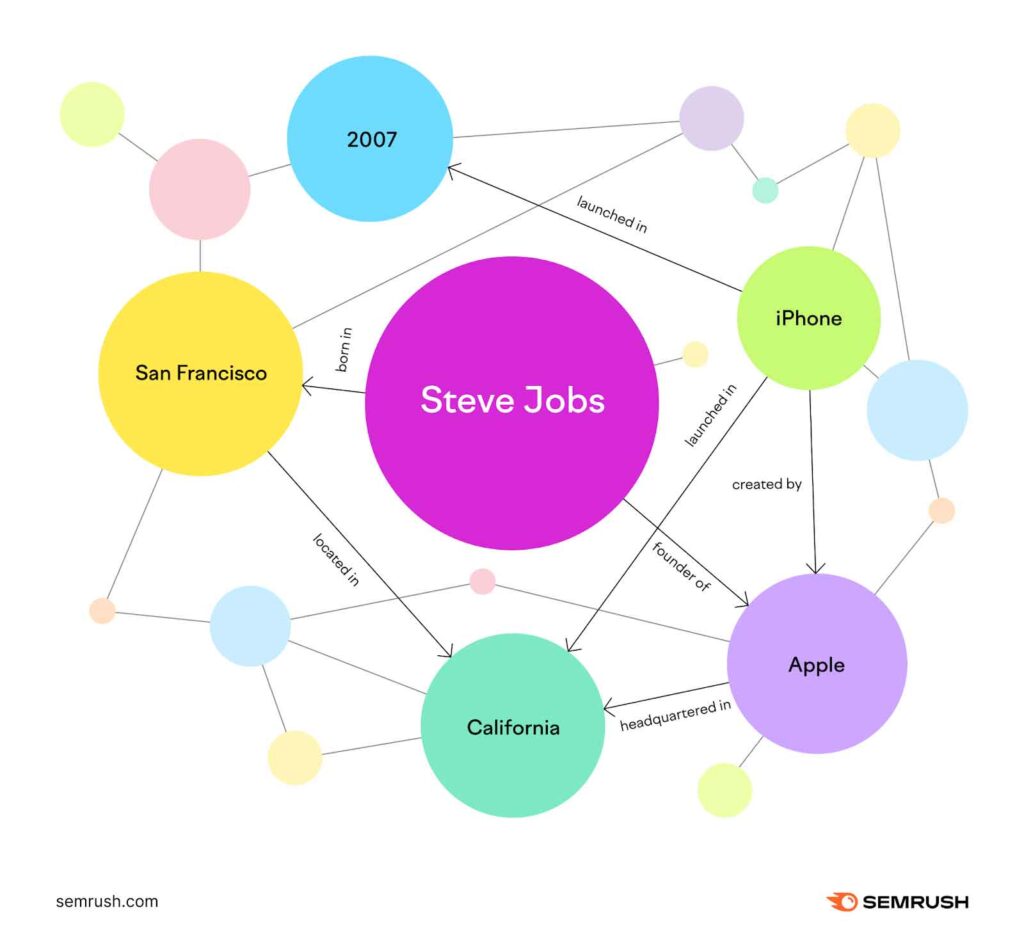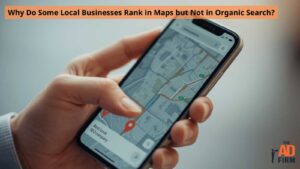Local SEO has evolved beyond keyword matching. Modern search algorithms now prioritize businesses that establish clear, authoritative identities online. This article explains how entity optimization drives this transformation and provides actionable implementation strategies. The result is higher visibility in search results and more qualified traffic. Let’s dig deeper into how this strategy can revolutionize your local SEO performance.
What is Entity Optimization in SEO?
Entity optimization in SEO establishes your business as a distinct, identifiable entity that search engines can recognize and connect to relevant information. Unlike traditional local SEO, which often emphasizes surface-level indicators, entity optimization focuses on building a structured, interconnected profile that highlights relationships, context, and the overall identity of your business.
| Aspect | Traditional Local Referencing | Entity-Based Local Referencing |
| Focus | Keyword matching and density | Semantic relationships and context |
| Content Strategy | Keyword-stuffed pages with location modifiers | Comprehensive, topically relevant content covering entity relationships |
| Technical Implementation | Basic meta tags and simple directory listings | Structured data markup, schema implementation, and Knowledge Graph optimization |
| Search Engine Understanding | Surface-level keyword recognition | Deep contextual understanding of business identity and relationships |
| Authority Building | Quantity-focused backlinks and citations | Quality-focused entity mentions, co-occurrences, and authoritative connections |
| Measurement of Success | Ranking for specific keywords | Knowledge Panel presence, semantic search visibility, and topical authority |
Search engines now place greater emphasis on how businesses connect within their industry and local area, rather than just matching keywords. Considering the broader context of your business and its links to other relevant entities creates a stronger and more credible presence in local SEO.
Also Read: Local Citation Management (Local SEO Guide)
Types of Local SEO Entities
Entities come in all sizes, from large corporations to small businesses. Types of entities related to local businesses include:
- Geographic Entities
Location-based entities define where your business operates and serves customers. They include cities, neighborhoods, regions, landmarks, and geographic boundaries that help search engines understand your business’s physical presence and service area. - Business-Related Entities
These entities represent your business itself, including your business name, brand identity, legal structure, and organizational attributes. They help establish your business as a unique, recognizable entity in search engine databases and distinguish you from competitors. - Service-Related Entities
These are keywords and concepts related to the business’s industry and the specific services or treatments offered. They encompass the professional solutions, procedures, and specialized offerings that define what your business provides to customers and help search engines match your expertise with relevant queries. - Industry-Specific Entities
These entities encompass specialized terminology, standards, certifications, and concepts unique to your particular industry vertical. They include technical terms, professional designations, industry regulations, and sector-specific knowledge that demonstrate your expertise and help search engines categorize your business correctly within your field. - Community and Event Entities
These entities connect your business to local happenings, organizations, and community activities that demonstrate civic engagement and local relevance. They include local events, sponsorships, community partnerships, and neighborhood initiatives that reinforce your business’s integration within the local ecosystem. - Team/People Entities
These entities represent the individuals behind your business, including owners, key staff members, and team personalities who contribute to your service delivery. They humanize your business and can establish individual authority through professional credentials, expertise, and personal brand presence that complements your business entity. - Attribute-based Entities
These entities describe specific characteristics, features, and qualities that define your business operations and offerings. They include operational attributes like hours of operation, payment methods, accessibility features, and distinctive characteristics that help potential customers understand what makes your business unique and whether it meets their specific needs.
| Entity Type | Examples |
| Geographic Entities | San Francisco, Downtown District, Bay Area, Golden Gate Park, Mission District |
| Business-Related Entities | Smith & Associates Law Firm, Local Coffee House, Premier Dental Care, ABC Plumbing Services |
| Service-Related Entities | Teeth whitening, Root canal therapy, Preventive dentistry, Emergency dental care, Pediatric dentistry |
| Industry-Specific Entities | HIPAA compliance, Board certification, Professional liability insurance, State licensure, Industry accreditation |
| Community and Event Entities | Annual Street Fair, Chamber of Commerce, Free dental screening day, Local charity sponsorship, Community health initiative |
| Team/People Entities | Dr. Sarah Johnson, Practice Manager, John Smith, Certified dental hygienist, Licensed practitioner, Expert team member |
| Attribute-Based Entities | 24-hour service, Wheelchair accessible, Accepts insurance, Same-day appointments, Emergency services available |
How Entity Optimization Works for Local SEO
To appear in Google’s Knowledge Graph, businesses need verified Google Business Profiles, Wikipedia articles, Wikidata entries, or mentions in authoritative databases. Knowledge Panels typically appear for businesses with strong entity signals across multiple platforms. Taking a few steps can help your business appear in the right searches and get noticed by more people.
Transform Your Online Strategy with The Ad Firm
- SEO: Achieve top search rankings and outpace your competitors with our expert SEO techniques.
- Paid Ads: Leverage cutting-edge ad strategies to maximize return on investment and increase conversions.
- Digital PR: Manage your brand’s reputation and enhance public perception with our tailored digital PR services.
One key factor is Google’s Knowledge Graph, which collects information from reliable sources like Wikipedia, Wikidata, and the CIA World Factbook and organizes it into a graph format. This system maps relationships between entities, helping Google understand connections and show your business more accurately in search results.
One key factor is Google’s Knowledge Graph, which collects information from reliable sources like Wikipedia, Wikidata, and the CIA World Factbook. This system maps relationships between entities, helping Google understand connections and display your business accurately in search results.
Three key mechanisms drive entity optimization’s impact on local SEO performance:
Semantic Understanding
Semantic SEO helps search engines grasp the meaning behind your content, not just individual keywords. It analyzes context, relationships, and topics to understand what your business offers and who it serves. By optimizing your site semantically, you ensure search engines accurately interpret your services, locations, and offerings, making your business more visible for relevant searches, even when users phrase queries differently.
Relevance to Local Queries
Relevance is about showing search engines which local searches are most appropriate for your business. Providing detailed information about your services, locations, and related topics helps Google see which queries match your business. The more complete and organized your information, the more accurately your business can be displayed to local searchers. This ensures you appear for the searches that matter most.
Building Recognition and Trust
Recognition and trust come from consistent mentions, reviews, and links from trusted local sources. Being cited by reputable sites, publications, or industry partners signals authority to search engines. Both the quality and frequency of these references matter, helping your business stand out as a credible and established presence.
How to Improve Your Local Ranking on Google?
There are several practical steps you can take to boost your visibility in local search results. These actions help your business stand out and reach more potential customers in your area.
Optimize Your Google Business Profile (GBP)
This is the cornerstone of local SEO. Ensure all information (Name, Address, Phone number or NAP, hours, categories, photos, and services) is complete, accurate, and regularly updated. This helps Google verify your business as a distinct, legitimate entity. Your Google Business Profile is often the first impression potential customers have of your business. It serves as the primary source of information Google uses to understand and display your business in local search results.
Elevate Your Market Presence with The Ad Firm
- SEO: Boost your search engine visibility and supercharge your sales figures with strategic SEO.
- PPC: Target and capture your ideal customers through highly optimized PPC campaigns.
- Social Media: Engage effectively with your audience and build brand loyalty through targeted social media strategies.
Complete every section thoroughly, upload high-quality photos regularly, select the most specific categories possible, and keep your information current. Regular posts, Q&A responses, and updates signal to Google that your business is active and engaged, which can positively impact your rankings. Every piece of information you provide helps Google better understand and confidently display your business to relevant local searches.
Read More: How to Use Google Business Profile for Local SEO Success
Ensure NAP Consistency Across the Web
Maintain consistent business information across all online directories, social media platforms, and local listing sites. Inconsistencies confuse search engines and can harm your credibility and rankings.
Examples of Local Listing Sites:
- Google Business Profile: The most important platform for appearing in local search results and maps.
- Yelp: Widely used by consumers to find local businesses and read reviews.
- TripAdvisor: Key for businesses in travel, hospitality, and dining to reach local and visiting customers.
- Facebook Business Pages: Social platform listings that provide location, contact info, and reviews.
- Bing Places: Microsoft’s local listing service, important for visibility on Bing search results.
- Industry-specific directories: Niche directories relevant to your business, such as Healthgrades for medical providers or Avvo for legal professionals, can boost authority and relevance.
Conduct regular audits of your business information across the web, ensuring that your name, address, and phone number are formatted identically everywhere. Even small variations like “St.” versus “Street” or differences in suite number formatting can create confusion. Consistent listings reinforce to search engines that all these references belong to the same verifiable business, strengthening your entity profile and improving local search performance.
Use tools like Moz Local, BrightLocal, or manual Google searches for your business name to identify citation inconsistencies. Tools like Whitespark and Yext can help manage and update citations across multiple platforms simultaneously.
Leverage Schema Markup
Implement structured data (schema markup) on your website to explicitly tell search engines about your business entity, its location, operating hours, reviews, and product/service offerings. This helps search engines process information more easily and potentially display richer search results. Schema markup is the technical language that communicates directly with search engines in a format they can understand with absolute clarity. By implementing the LocalBusiness schema, you provide search engines with structured, unambiguous data about your entity that complements the information they gather from other sources.
Enhance Your Brand Visibility with The Ad Firm
- SEO: Enhance your online presence with our advanced SEO tactics designed for long-term success.
- Content Marketing: Tell your brand’s story through compelling content that engages and retains customers.
- Web Design: Design visually appealing and user-friendly websites that stand out in your industry.
This structured data can enable rich snippets, enhanced map listings, and other featured search results that significantly improve your visibility and click-through rates. Think of schema markup as providing search engines with a detailed, structured profile of your business entity that leaves no room for interpretation. You’re explicitly defining who you are, what you offer, where you’re located, and how customers can engage with you.
Create Location-Specific, Comprehensive Content
Move beyond keyword-focused pages to create in-depth, locally relevant content that covers entire topics related to your business. This demonstrates expertise and shows search engines that your business is a valuable resource for your local audience.
Examples of Content:
- Guides to local services or regulations: e.g., “A Complete Guide to Dental Insurance in [City/State]”
- Blog posts about local events: e.g., “Top Family-Friendly Festivals in [City] This Year”
- Case studies with local clients: e.g., “How [Local Business] Improved Their Smiles with Our Services”
- Seasonal or climate-specific tips: e.g., “Oral Health Tips for Summer in [City/Region]”
- Neighborhood or city guides: e.g., “Best Restaurants and Cafes Near [Your Business Location]”
High-quality, comprehensive content establishes your business as a topical authority within your area and industry. Developing substantial resources that fully address the topics your local customers care about builds strong associations between your business, location, and audience. This also encourages links, shares, and engagement, which signal authority and relevance to search engines.
Build Local Citations and Backlinks
Earn high-quality links and mentions from reputable local sources, such as local news publications, business associations, or partner organizations. This reinforces your business’s connection to the community and boosts its authority. Each quality citation and backlink from a relevant local source acts as a vote of confidence that validates your business entity’s legitimacy and local relevance. Focus on earning mentions in contexts that make semantic sense, being featured in a local business roundup, getting covered for a community initiative, or being listed as a partner by a local organization all create meaningful entity associations.
Advance Your Digital Reach with The Ad Firm
- Local SEO: Dominate your local market and attract more customers with targeted local SEO strategies.
- PPC: Use precise PPC management to draw high-quality traffic and boost your leads effectively.
- Content Marketing: Create and distribute valuable, relevant content that captivates your audience and builds authority.
Manage and Encourage Reviews
Promptly respond to all customer reviews (positive and negative). The content of reviews also helps Google understand which entities and services you offer, further enhancing relevance. Reviews serve multiple purposes in entity optimization. They provide fresh, user-generated content that reinforces your entity’s attributes and services, signal to Google that your business is active and engaged with customers, and provide social proof that builds trust and prominence.
To learn more about staying ahead in competitive areas, read our blog: Using AI to Predict Local SEO Trends in Competitive Markets.
Partnering with a Local Digital Marketing Company
If you’re looking for help implementing these strategies, a local digital marketing company is the right choice. The Ad Firm has guided many businesses in the area to improve their online presence, boost search rankings, and attract more qualified customers. With expert support, you can ensure your business listings are consistent, your content is relevant, and your entity optimization is done correctly for maximum impact.
Take the Next Step
Working with The Ad Firm gives you hands-on support from professionals who understand your local market. From auditing your online presence to creating location-focused content, they provide tailored solutions that help your business stand out. Contact The Ad Firm today to see how their digital marketing expertise can elevate your local visibility and drive real results.





